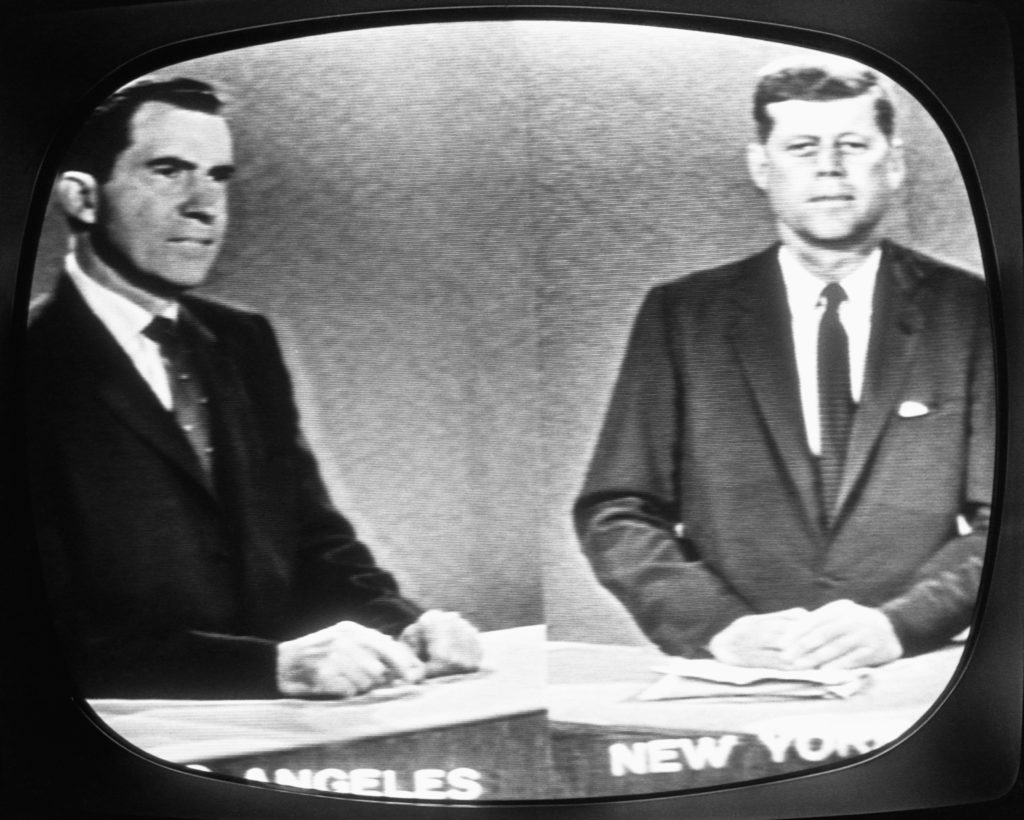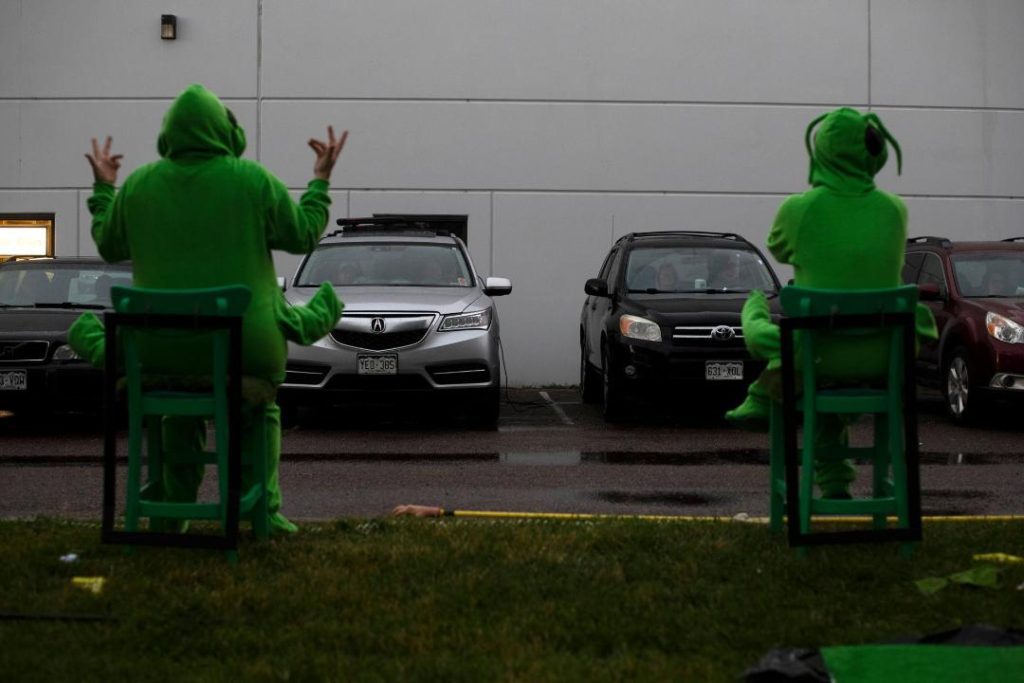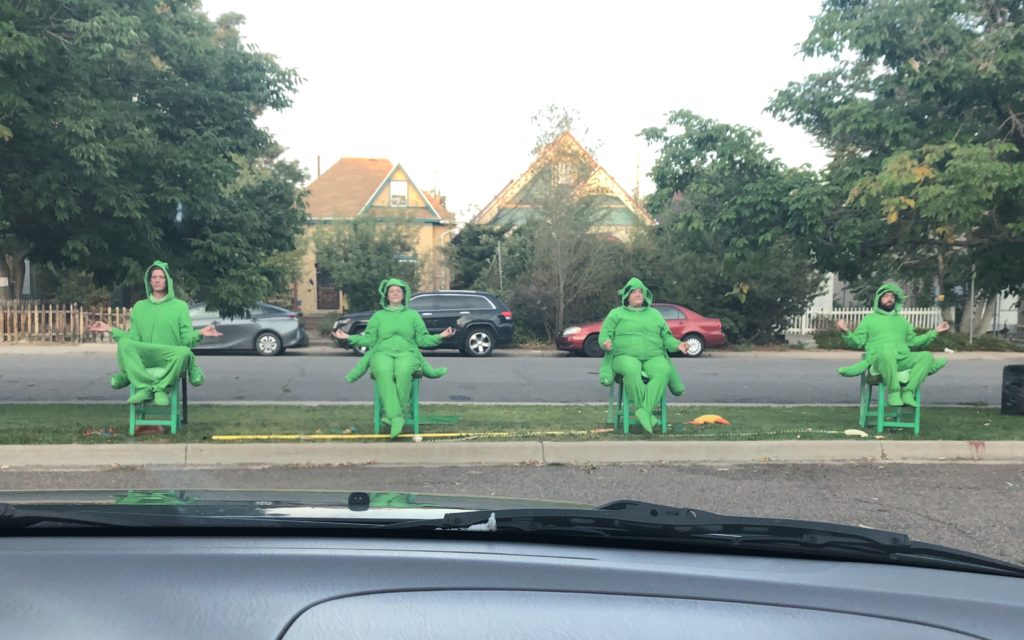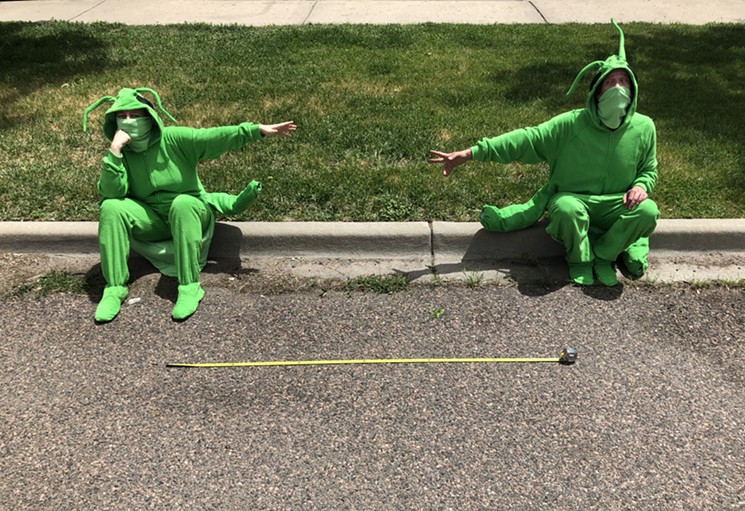Photo: Members of Denver’s Buntport Theater, thinking drive-in theater would be pandemic-proof, tried to imagine what kind of creatures belong on a lawn. Their solution: “The Grasshoppers.” Credit…Rachel Woolf for The New York Times
Inside a former firehouse in Richmond, Va., a lone actor performs “The Picture of Dorian Gray” for audiences as small as two. In a Denver parking lot, theatergoers in cars watch, through their windshields, four performers costumed as grasshoppers. On a 600-acre property in Arkansas, a cast of about 130 re-enacts the story of Jesus for several hundred ticket-holders spread across a 4,000-seat outdoor amphitheater.
The coronavirus pandemic has shuttered Broadway through the end of the year (at least), and the nation’s big regional theaters and major outdoor festivals have mostly pivoted to streaming. But even as infections surge in the United States, many theaters are finding ways to present live performances before live audiences.
Of course, there is social distancing. Also, in some places, masks. Temperature checks. Touchless ticketing. Intermissionless shows. And lots of disinfectant. At the Footlights Theater, in Falmouth, Maine, actors will perform behind plexiglass.
But these precautions mean there is dinner theater in Florida. Street theater in Chicago. Drive-in theater in Iowa.
“Our commitment is to do live theater — there’s a huge difference between that and seeing something on a computer screen,” said Susan Claassen, managing artistic director of Invisible Theater in Tucson, Ariz., a state that has emerged as a Covid-19 hot spot. The theater, which has been running a four-character play called “Filming O’Keefe” indoors, installed an air ionizer, allowed patrons in only one-quarter of its seats, mandated that they wear masks, and put on a show.
“Our theater got its name from the invisible energy that flows between performers and the audience,” Claassen said. “Even with 22 people in the audience with masks on, that energy is so strong.”
There are also financial reasons for continuing: Some theaters say they cannot survive a year without revenue.
“We’d rather go down creating good theater than die the slow death behind our desks,” said Bryan Fonseca, the producing director of Fonseca Theater Company in Indianapolis. The company plans to stage “Hype Man,” a three-character play by Idris Goodwin, outdoors, for 65 mask-wearing patrons. “I am hopeful and also very cautious,” Fonseca said, “careful that I don’t create a problem.”
By putting on shows, some theater artists are, in effect, making the case that it is a mistake for the industry to wait for New York to lead the way, given the risks there. “Someone has to be the first to take that cautious step into the dark to see what works and what doesn’t,” said Phil Kenny, a sometime Broadway producer who has a role in “Willy Wonka” in Orem, Utah.
But even in New York City there are signs of theatrical life. Food for Thought Productions, a company that presents staged readings of one-act plays, is planning to restart in a private club on July 13, with Louise Lasser and Bob Dishy performing and attendees required to have taken coronavirus tests.
“If we can prove that we can do this safely, maybe other groups can do safe theater as well,” said Susan Charlotte, the founding artistic director.
No guarantees
The pandemic remains a concern for any of the planned productions.
In Fort Myers, Fla., the Broadway Palm Dinner Theater postponed “The Sound of Music” as the number of confirmed cases surged in that state. In Houston, Theater Suburbia canceled “Daddy’s Dyin’ Who’s Got the Will?” citing a local stay-at-home advisory. And in Salt Lake City, where the Grand Theater was planning a run of “To Kill a Mockingbird” in which all the performers were masked, the theater scuttled the production just four nights before it was to begin, citing rising local caseloads.
But many are persisting. In Jacksonville, Fla., even as the mayor imposed an indoor mask order, the Alhambra dinner theater is continuing to stage “Cinderella.” The theater is selling only 50 percent of its seats; it has installed plexiglass between its seating tiers; patrons must wear masks after they eat; performers wear gloves and face away from each other during any partnered dancing; and, at the end, Cinderella and the Prince share an elbow bump instead of a kiss. (The audience invariably laughs.)
“I feel very comfortable, and I’m definitely not worried about my health,” said Olivia Zeisloft, 18, who is playing the title role (and whose grandfather is the director). “It’s been an amazing experience.”
Actors’ Equity Association has barred its members from performing onstage, and the Alhambra is one of several theaters that have adjusted as a result, deciding for the first time in years to use nonunion actors.
The Salt Lake City production of “Mockingbird” recast the role of Atticus Finch after an Equity actor would not perform. And in western Virginia, the American Shakespeare Center, which normally has both Equity and non-Equity companies, is planning to use only its nonunion performers this summer.
Equity is not happy, and warning that “moving forward, we will shine a spotlight on theaters that decide to make the reckless and irresponsible choice to put the safety of their audience and workers at risk,” according to Mary McColl, the union’s executive director.
Thinking small, staying big
Summer is beautiful. But this summer is strange.
Denver’s Buntport Theater, which usually presents work in a 100-seat warehouse, decided to create outdoors, and, like several other theater companies around the nation, looked to the drive-in for inspiration. The result: “The Grasshoppers,” in which four actors wearing adapted onesies perform an isolation-themed piece for patrons in cars. “It both feels like you’re doing theater and not like you’re doing theater,” said Erin Rollman, a company member.
Then there is street theater, getting a new look from artists idled by the pandemic. In Chicago, the ad hoc collective Random Acts of Theater dons costumes to perform for passers-by some weekends. They dressed as seniors, carrying babies, in a work called “The Future is Watching Us,” and marked Juneteenth in oversized masks. Up next: something involving large bird puppets.
“This is a time when everyone feels frightened and weird,” said one of the organizers, Jessica Thebus, who runs the graduate directing program at Northwestern University. “Bringing art to people walking down the street feels really important.”
But there are also pageant-scale productions — big casts, lots of seats — underway in outdoor venues, including the Medora Musical in North Dakota, the Shepherd of the Hills Outdoor Dramain Branson, Mo., and the Great Passion Play in Eureka Springs, Ark.
“It’s been a bit of a challenge to do a play in the middle of a pandemic,” said Kent Butler, who stars as Jesus on Friday nights in Arkansas, and who also leads tours and serves as the production’s spokesman. Attendance, he said, is down, reflecting a decline in tourism and the disappearance of large travel groups.
The Great Passion Play, which has been running seasonally since 1968, takes place on a 500-foot-wide, three-tiered stage, making social distancing easier for actors; all but Jesus are also costumed with face coverings whenever their characters are not speaking.
“When I was playing Jesus last Friday night, a little girl, probably age 3, came up to me and wanted to be picked up,” Butler said. “It doesn’t look good if Jesus ignores a child, and I knew that, but also knew that for her health and safety and my own, it is very wise to use hand sanitizer. So I grabbed her hand in mine and walked her off the set all the way to where I knew there was hand sanitizer available, and was able to clean my hands and made her clean hers as well.”
The American Shakespeare Center will rotate “Othello” and “Twelfth Night” between indoor and outdoor stages, so audiences can choose where they are most comfortable. The acting company has agreed to an “isolation covenant.” And there are few virus cases in the theater’s Shenandoah Valley region.
“We got lucky in terms of geography,” said Ethan McSweeny, the theater’s artistic director. “That gives us an obligation to see if we can try and chart a course.”
There are clearly willing audience members. “Theater is something you crave,” said Jackie Schmillen, an Iowa television anchor who went to see a drive-in production of “Love Letters” in the Des Moines Playhouse parking lot. And Joel Bassin, the producing artistic director of the Firehouse Theater in Richmond, said his productions of “Dorian Gray” are selling out — albeit for audiences of only two, four or six people. “People do want to go out if we can assure them we’re controlling the risk,” he said.
Experiments in watching
A clutch of actors, draped in white, ran, leapt and danced around an outdoor basketball court in Claverack, N.Y., one recent night, recounting their dreams and re-enacting their visions.
Instead of footlights, there were the beams of headlights surrounding the makeshift stage. Inside the cars were audience members, listening to dialogue and music over their cellphones and radios.
That scene was near the end of a particularly ambitious example of pandemic-prompted experimentation: The director Michael Arden, a two-time Tony nominee, brought 33 theater artists together in New York’s Hudson Valley to develop a piece called “American Dream Study.”
For a few invitation-only run-throughs, masked audience members traveled by car and on foot from scene to scene — watching a woman in a floating canoe, a couple at a condemned mill, dancers at an abandoned oil tank, and the whole ensemble emerging from the woods to sing around a fire pit. They remained distant from the actors and one another.
The company, including the Tony winner Nikki M. James (“The Book of Mormon”), developed the piece while quarantining, with a nurse, at an inn; they remain hopeful but uncertain about whether the show will have a full production.
“We were finding a new mode of storytelling out of an obstacle,” Arden said, “and it really felt incredible.”
Michael Paulson July 4th, 2020 New York Times



